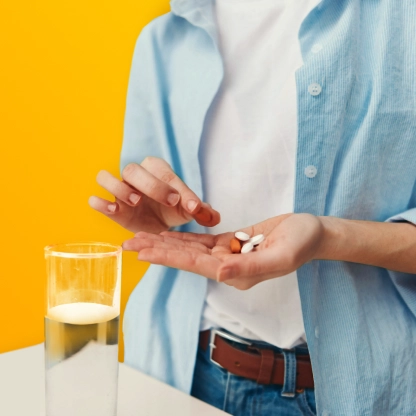.webp)
Article summary
Topic
The liver plays an irreplaceable and vital role in digestive processes. That’s why it’s so important to maintain an appropriate diet to facilitate its functioning. As part of digestive processes, the liver is responsible for detoxifying the body – the process of expelling toxins from the human body through digestive processes. We can support this function by consuming foods helpful for the liver such as avocados, beets, lemon, garlic, cloves, grapefruit, ginger, milk thistle, green vegetables, and drinking green tea. Some of them will benefit everyone, while others will only be helpful only for those with an already properly functioning liver. Check out an overview of each of these ingredients below and find out how to prepare them the right way.
Fruits and vegetables as key helpers


Supports proper liver functioning and is also an important partner in helping the liver get rid of harmful free radicals. It cleanses the body of toxins, lowers cholesterol, maintains blood pressure, accelerates blood filtration and has an antioxidant effect or even improves digestion. Betroots also contain a fiber called pectin, which powerfully cleanses the liver by removing toxins from it. They also include many compounds supporting proper liver function, such as beta-alanine, beta-cyanine, fiber, iron and folic acid. This vegetable also counteracts the risk of liver cancer, and increases gastric acid secretion, which aids digestion and helps the body control the amount of free radicals in the “bad” LDL cholesterol; After consuming beetroots, the color of urine may turn red, but do not be afraid of this – it is a completely normal effect caused by the intense color of beetroots. Beetroots are tasty and easy to incorporate into your diet. Do not consume beetroots if you suffer from constipation or kidney problems.

Should only be included in your diet when you are confident that your liver is in good health. Otherwise, it will irritate an unhealthy liver. So, if your liver condition allows it, garlic is most welcome; its constituent compound called allicin prevents the development of bacteria, cancer, viruses, and atherosclerosis. Garlic rebuilds the liver parenchyma thanks to the omega-3 fatty acids it contains; these acids are the building blocks of cell membranes, including those of the liver. Garlic is a source of plant sterols (phytosterols) – compounds which counteract atherosclerosis, lowering the concentration of cholesterol in the blood, especially “bad” cholesterol – LDL. Garlic also helps the liver in getting rid of harmful fats and in the excretion of cholesterol along with bile acids. It’s worth using as a preventive measure, as it effectively protects against bacteria and fungi; however, it is not suitable for everyone; therefore, be sure to first check if it is actually good for you.

Has a thermogenic effect on the liver which helps the liver in removing toxins from the body. The best way to consume it is with lemon juice – in a hot infusion, right before you go to bed. It also contains plenty of vitamin C, B1, B2, and magnesium, important aids for the immune system. However, avoid it if you suffer from stomach and liver diseases, as it will result in irritation.

Thanks to naringenin (an organic compound), it helps improve blood filtration, thus supporting liver function and the regeneration of liver cells. Additionally, it contains plenty of vitamin C and antioxidants (just like lemons) that activate digestive enzymes, thus assisting natural liver cleansing. However, you should refrain from eating it if you take liver medicines as it blocks the activity of certain enzymes responsible for drug digestion.

Eat chicory, kale, arugula, watercress, spinach and lettuce as often as possible. They serve the body with their high levels of chlorophyll which cleanses the blood and liver. They also offer a high concentration of nitrate which reduces fat accumulation in the liver, protecting us from developing non-alcoholic fatty liver disease (NAFLD).

Supports the production of enzymes in the liver that neutralize toxins dangerous for the body. Furthermore, it’s an important source of vitamin C and antioxidants which assist the creation of the aforementioned enzymes.
Fluids as a key helper
- Contains catechins that reduce fat deposited in the liver and support the functioning of this organ,
- Contains polyphenols (a type of antioxidant) that destroy toxins, harmful to the body when they accumulate,
- Counteracts the harmful effects of free radicals on hepatocytes (liver cells),
- Reduces the levels of liver enzymes - alanine aminotransferase (ALT) and aspartate aminotransferase (AST)
- Anti-inflammatory and hepatoprotective effects (protects liver cells and lowers liver enzyme levels)

Beet kvass obtained from beetroots can help those suffering from liver failure. It improves digestion, cleanses the body of toxins, also lowers cholesterol and blood pressure; much like coffee, tea and cloves, beetroots have an antioxidant effect, helping the liver get rid of harmful free radicals. During the liver cleansing treatment using beet kvass (lasting preferably five days), the color of urine may turn red, but do not be afraid of this – it is a completely normal effect caused by the intense color of beetroots and is not dangerous to your health; remember that beet kvass should absolutely not be consumed by diabetics or those suffering from constipation or kidney problems, such as kidney stones.

Drinking green tea brings the best benefits when combined with at least moderate physical activity.
A 2015 study published in the International Journal of Clinical and Experimental Medicine exhibited that drinking green tea reduces the risk of liver diseases such as cirrhosis (by 44%), chronic liver disease (by 51%), fatty liver (by 43%), and hepatocellular carcinoma (by 26%).

Is a real treasure trove of vitamins and minerals. It’s created in the process of apple fermentation with the presence of bacteria. It offers several health benefits, particularly for the digestive system; Like beetroots, it contains pectin, which cleanses the liver and additionally, enzymes that stimulate the work of digestive juices in the stomach. To achieve proper cleansing therapy, drink apple cider vinegar between meals, combined with distilled water, in the following ratio: two tablespoons of vinegar to two liters of water. Please note that apple cider vinegar is harmful to people with chronic gastrointestinal diseases – including liver disease – as well as to pregnant women, as it can cause heartburn.

Coffee drinkers will be pleased to know that coffee is beneficial for the liver. Usually considered a stimulant, it turns out that the caffeine does not harm the liver at all. It is just a matter of moderation (maximum five cups of coffee a day). interestingly, instant coffee has more health benefits than other types of coffee, due to its high content of chlorogenic acid, the main component of polyphenols (antioxidant compounds). Coffee is an anti-inflammatory, supports liver cells and their regeneration. This is achieved thanks to diterpenes present in coffee (including cafestol and kahweol), as well as polyphenols (antioxidants, including chlorogenic acid), and plant sterols, which can also be found in garlic; if your liver is healthy, drinking coffee with milk or butter will not cause any problems; however, if you combine coffee with these ingredients or with coconut oil, it can result in generating insoluble complexes of compounds which reduce the antioxidant benefits of coffee; so, if you want the best for your liver, especially if it is not in good shape, choose a short black coffee instead of a large latte. in conclusion, coffee alone is good for everyone, preferably without any added ingredients.
Accelerate liver regeneration with Phospholipids (Essentiale® Forte P)
Plants as a key helper

Contains silymarin which detoxifies and regenerates the liver by sealing the cell membranes of this organ. It also supports the production and secretion of bile, thus intensifying digestive processes.

Is one of the oldest cultivated plants, grown by the Indians in the pre-Columbian period. It can protect liver cells from the toxic effects of alcohol and certain medication. Its grains and seeds are an excellent source of antioxidants, thanks to their high content of phenols, tocopherols, and other bioactive components. Amaranth is usually available in health food shops, in the form of products such as flour, muesli, bread, and cereal. You can also add one or two tablespoons of amaranth to yogurt or oatmeal.

Strengthen the liver - the secret lies in eugenol (an oil with antibacterial and antiviral properties) and a high concentration of antioxidants. Eugenol helps eliminate toxins from your body and counteracts infections, reduces liver inflammation caused by alcohol consumption, thus strengthening your immunity and enhances antioxidant activity of the liver which remove free radicals from the liver.1

Is a thermophilic plant, of which there are seventy species. Most people are familiar with it as a cooking spice. It has a positive and extensive effect on the human body - bactericidal, spasmolytic, and anti-inflammatory properties. Especially recommended for those suffering from inflammation of the bile ducts, as it supports their regeneration and proper functioning. It also restores the proper contractility of the gallbladder and a muscle called the sphincter of Oddi, which guards the entrance to the duodenum. The most important active ingredient in turmeric rhizome is curcumin, which boasts strong anti-inflammatory properties. In the food industry it is labelled as E100, it comes from the group of polyphenols and is one of the most powerful plant antioxidants. Curcumin fights cancer cells, especially those resistant to other treatments.2 However, it is important to note that there are known cases of hepatitis in people who take turmeric extract supplements on their own. For this reason, you should only take such supplements after having consulted your doctor and in reasonable amounts.
- Watson S. 12 Foods To Help Fatty Liver Reversal. https://www.healthline.com/health/fatty-liver-diet – DOA: 2021.02.12.
- Tong Zhou et al. Protective Effects of Lemon Juice on Alcohol-Induced Liver Injury in Mice. https://www.ncbi.nlm.nih.gov/pmc/articles/PMC5439254/- DOA: 2021.02.12;
- Augustin K.: Therapeutic values of onion (Allium cepa L.) and garlic (Allium sativum L.). Indian J Exp Biol. 1996 Jul;34(7):634-40.
- IŻŻ: KAWA – wschodząca gwiazda prewencji chorób? Instytut Żywności i Żywienia | Wrzesień 2018.
- Muriel P. et al.: Coffee and the Liver. 2017.
- Muriel P. et al. Coffee and liver diseases. Fitoterapia 81 (2010) 297–305
- Kim J., Cha Y., Lee K. i wsp,: Effect of onion peel extract supplementation on the lipid profile and antioxidative status of healthy young women: a randomized, placebo-controlled, double-blind, crossover trial. Nutr Res Pract 2013, 5, 373-379.
- Wala K. et al.: Cebula – niedocenione źródło korzyści terapeutycznych. Med Rodz 2019; 22(1): 41-46.
- Al-Okbi, S. Y., Mohamed, D. A., Hamed, T. E. & Edris, A. E.: Protective effect of clove oil and eugenol microemulsions on fatty liver and dyslipidemia as components of metabolic syndrome. J. Med. Food 17(7), 2014, 764–771.
- Iwano H. et al.: Effect of dietary eugenol on xenobiotic metabolism and mediation of UDP-glucuronosyltransferase and cytochrome P450 1A1 expression in rat liver. International Journal of Food Sciences and Nutrition, 2014, 65, 2, 241-244.
- Curcumin-treated cancer cells show mitotic disturbances leading to growth arrest and induction of senescence phenotype. The International Journal of Biochemistry & Cell Biology. 2016.
%20(1)%20(1).webp)


